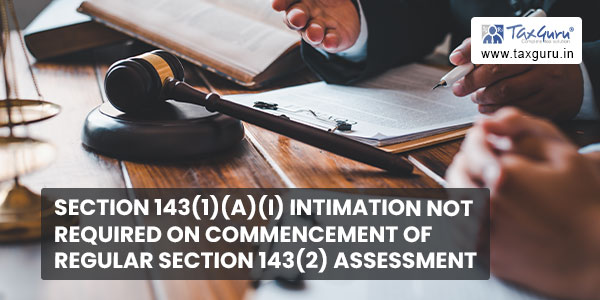On commencement of regular assessment proceedings u/s 143(2) of Act , there is no need for intimation u/s 143(1)(a)(i)
Where the summary procedure under section 143(1)(a)(i) has been adopted, there is scope available for the revenue to make assessment u/s 143(3) of the Act. But the converse is not available. A regular assessment proceeding having been commenced under Section 143(2), there is no need for a summary proceeding under Section 143(1)(a),
Observation of the Hon’ble Supreme Court of India
Commissioner Of Income-Tax vs Gujarat Electricity Board on 12 November, 2002
Even otherwise, the view taken by the Gujarat High Court seems to be correct on principle. There is no dispute that Section 143(1)(a) of the Act enacts a summary procedure for quick collection of tax and quick refunds. Under the scheme if there is a serious objection to any of the orders made by the Assessing Officer determining the income, it is open to the assessee to ask for rectification under Section 154. Apart therefrom, the provisions of Section 143(1)(a)(i) indicate that the intimation sent under Section 143(1)(a) shall be without prejudice to the provisions of Sub-section (2). The Legislature, therefore, intended that, where the summary procedure under Sub-section (1) has been adopted, there should be scope available for the Revenue, either suo motu or at the instance of the assessee to make a regular assessment under Sub-section (2) of Section 143. The converse is not available; a regular assessment proceeding having been commenced under Section 143(2), there is no need for a summary proceeding under Section 143(1)(a),

Full text of the judgement is as under.
Supreme Court of India
Commissioner of Income-Tax vs Gujarat Electricity Board on 12 November, 2002
Equivalent citations: (2003) 181 CTR SC 28, 2003 260 ITR 84 SC
Bench: R Pal, B Srikrishna
ORDER
1. These appeals are directed against two orders of the Gujarat High Court dismissing appeals under Section 260A of the Income-tax Act, 1961, on the ground that no substantial question of law arose in the appeals. The High Court relied on its own earlier judgment in Gujarat Poly-Avx Electronics Ltd. v. Dy. CIT[1996] 222 ITR 140 and also on the fact that a similar view has been taken by other High Courts.
2. The short question which arises in these appeals is whether it is open to the Revenue to issue intimation under Section 143(1)(a)of the Income-tax Act, after notice for regular assessment has been issued under Section 143(2)of the Income-tax Act, 1961?
3. As far as the Gujarat High Court was concerned, the question was not res integra as it had before it the judgment in Gujarat Poly-Avx Electronics Ltd. v. Dy, CIT [1996] 222 ITR 140 and, therefore, the High Court was right in holding that a substantial question of law did not arise for determination. Mr. T.L.V. Iyer, learned senior counsel for the appellant, submits that the question needs to be decided by this court.
4. Learned counsel appearing for the respondents have pointed out that in a number of judgments several High Courts have consistently taken the view that once regular assessment proceedings have commenced under Section 143(2) of the Income-tax Act, 1961, it is a limitation on the jurisdiction of the Assessing Officer to commence proceedings under Section 143(1)(a)of the Act.
5. Even otherwise, the view taken by the Gujarat High Court seems to be correct on principle. There is no dispute that Section 143(1)(a)of the Act enacts a summary procedure for quick collection of tax and quick refunds. Under the scheme if there is a serious objection to any of the orders made by the Assessing Officer determining the income, it is open to the assessee to ask for rectification under Section 154. Apart therefrom, the provisions of Section 143(1)(a)(i) indicate that the intimation sent under Section 143(1)(a) shall be without prejudice to the provisions of Sub-section (2). The Legislature, therefore, intended that, where the summary procedure under Sub-section (1) has been adopted, there should be scope available for the Revenue, either suo motu or at the instance of the assessee to make a regular assessment under Sub-section (2) of Section 143. The converse is not available; a regular assessment proceeding having been commenced under Section 143(2), there is no need for a summary proceeding under Section 143(1)(a),
6. In the result, we see no infirmity in the judgment of the High Court. The appeals are dismissed. There shall be no order as to costs.
Civil Appeals Nos. 4319-4320 of 2001 and C. A. Nos. 821-822 of 2001:
7. In view of and for the reasons in the judgment in Civil Appeals Nos. 3821-3822 of 2000, these appeals also stand dismissed with no order as to costs.





